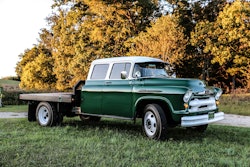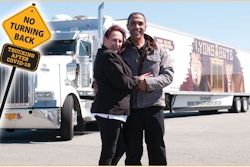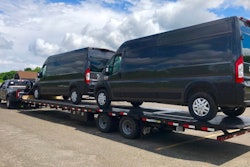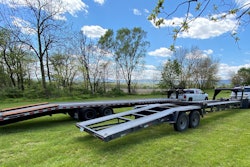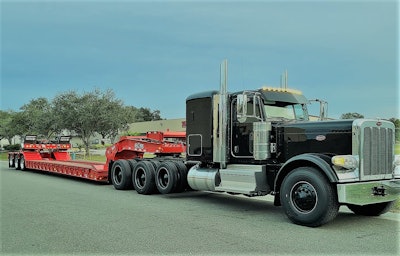 Small-fleet owner Jesse McGinness was going for originality with the look of this 2021 Peterbilt 389, spec'ing the black Alcoa rims from the factory. After his maiden voyage in a Class 8 tractor years ago, in a Peterbilt 379, he fell in love with the classic square-hood series. He plans to modify the stacks, the grille and more to all-black finish -- committing sacrilege, says the operator who took him on that first 379 run. McGinness'll maintain plenty in chrome/stainless accents, not to worry. The flattop with lift-axle is powered by the X15 Cummins at 605 hp, with an 18-speed transmission. "I wanted this truck to be a truck that I thought was cool," McGinness said, in addition to doing the tough over-dimensional/heavy hauling he'll require of it.
Small-fleet owner Jesse McGinness was going for originality with the look of this 2021 Peterbilt 389, spec'ing the black Alcoa rims from the factory. After his maiden voyage in a Class 8 tractor years ago, in a Peterbilt 379, he fell in love with the classic square-hood series. He plans to modify the stacks, the grille and more to all-black finish -- committing sacrilege, says the operator who took him on that first 379 run. McGinness'll maintain plenty in chrome/stainless accents, not to worry. The flattop with lift-axle is powered by the X15 Cummins at 605 hp, with an 18-speed transmission. "I wanted this truck to be a truck that I thought was cool," McGinness said, in addition to doing the tough over-dimensional/heavy hauling he'll require of it.Small-fleet owner Jesse McGinness is nothing if not resolute in the conviction that if you strive to solve the customer's problem, big or small, achievement of your goals will follow.
I spoke to Olympia, Washington-based McGinness yesterday after seeing the picture above posted to the 11-truck Watch This Freight fleet founder's Facebook page for the company. It was accompanied by a rumination on the steps that got him to where he was -- that is, purchasing his first Class 8 after several years running hotshot rigs with Landoll-type tilt trailers. The new rig is spec'd for heavy haul. Along with it he picked up the extendable RGN for fulfilling a bid he'd won for a series of loads six months out, from a longtime customer of his hotshots.
McGinness has been trucking for four years after a time in the Army, then mechanicking, managing a fleet shop, and buying and selling cars. The change came after he realized he was making more money transporting cars than selling them. Through his first years running hotshots, the 28-year-old said, he kept hearing a singular message from his customers: "If you get a semi, you could do this." When the RGN project reared its head, with six months to get ready for it, he jumped. "It's not heavy haul," but rather "long loads appropriate for an extendable trailer. 125 feet long."

Preparedness outside of the one job was a prerequisite, too, of course. Before he spec'd the tractor and lowboy, "I started calling some of my other customers," he said, including "equipment and rental company customers. They said, 'Yeah, we could use one of those.''"
He borrowed to finance the investment -- a sizable one for him, considering all prior purchases were Class 3 units with smaller trailers, though the company has moved loads up to 80-foot total length.
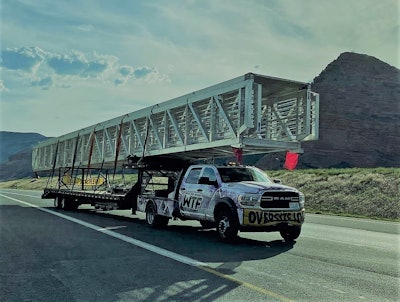 Among WTF's more interesting hauls is this load of 80-foot bridges intended as walkways to floating docks, evidence of McGinness's commitment to doing for the customer that which might seem impossible at first glance. 80-foot loads on a hotshot? No problem -- they're not near as heavy as they might look -- "just 6,000 pounds," he said. "They told us we couldn’t, but I said, 'Watch this.'" Occasionally, as seen here, the manufacturer "will nest them. ... The same company builds floating restrooms." To unload requires backing partway into the water.
Among WTF's more interesting hauls is this load of 80-foot bridges intended as walkways to floating docks, evidence of McGinness's commitment to doing for the customer that which might seem impossible at first glance. 80-foot loads on a hotshot? No problem -- they're not near as heavy as they might look -- "just 6,000 pounds," he said. "They told us we couldn’t, but I said, 'Watch this.'" Occasionally, as seen here, the manufacturer "will nest them. ... The same company builds floating restrooms." To unload requires backing partway into the water.
McGinness finalized the tractor spec and placed the new-tractor order through Dobbs Peterbilt in Bossier City, Louisiana (Shreveport area). From his shopping, he offers this tip for first-time new-truck buyers: Once you know your spec, don't be shy about shopping it around with dealers. There was a $22,000 difference between the high and low quotes he received on the same spec.span>
In that Facebook post of his that caught my attention, he noted that getting to where he is today wasn't principally a result of keeping any particular goal in his mind's eye or on a ledger. When he started the company in 2016, "I can assure you this Peterbilt 389 wasn't in the plan," he wrote. Rather:
"I remember the first time I was asked about my five-year-plan. I was almost 21 years old, about to get out of the Army. As I applied for a job at a repair shop/trucking company, the owner asked me that question in the interview -- "What's your five-year plan?" I had never thought about a five-year plan. I never considered what it would be. I probably came up with something cute to help get the job (which worked). Weeks turned into months, months turned into years, and I always think about a five-year plan. Do you always stick to the plan? Do we allow the plan to change? Does it have to be five years? Is the plan goal-based? Financially based? What is the plan?
I'll let you in on a secret. My five-year plan, in trucking, has never been based on finances. It's never been based on the number of trucks or drivers, it's not based on miles or dollars. Those sound like goals. My plans are based on customer service, and being the best in the industry.
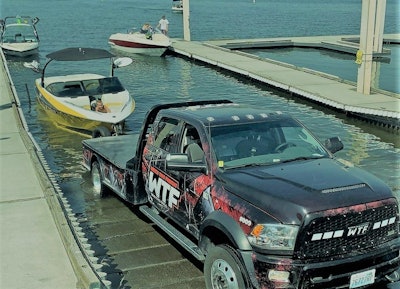 A carrier owner in Texas explained hotshot trucking to Jesse McGinness for the first time years ago, noting that with a true hotshot load, "someone has generally dropped the ball when they’re hiring us," he said. McGinness added, "and when someone’s calling for something expedited, someone down the chain said 'WTF,'" hence the matching acronym of his Watch This Freight company. Bonus: The initials, "when you show up to the job site," are memorable.
A carrier owner in Texas explained hotshot trucking to Jesse McGinness for the first time years ago, noting that with a true hotshot load, "someone has generally dropped the ball when they’re hiring us," he said. McGinness added, "and when someone’s calling for something expedited, someone down the chain said 'WTF,'" hence the matching acronym of his Watch This Freight company. Bonus: The initials, "when you show up to the job site," are memorable.
McGinness told me he sees narrowly focused goals sometimes getting in the way of overall business achievement, including for owner-operators out there, some even that work for him. (He has drivers on board hauling company equipment, some leasing equipment toward ownership from him, and bona fide-leased owners. He also operates the brokerage WTF Logistics, focused on building relationships with owner-ops in particular areas of the country as a customer's need arises.)
Too many people "get caught up in thinking that the goals are the point of attraction" in whatever they're pursuing, he said, "and set their mind on that," neglecting what will be of most use getting them to their goals.
His five-year plan today is simply based on service. "We are the 'get it done' company. You call us, and consider it done. Because I learned very quickly that success and money are both consequences of good customer service. If money becomes the plan's focus, or your No. 1 goal, you will lose sight of the things necessary to make dreams come true."
Surround yourself with a team you can count on to provide "the best possible service. I'm not interested in getting a job done cheap. My concern is getting the job done well.
"If you want to succeed, stop setting plans based on objects or dollars. Make the plan based on what you can do for others."
Success, McGinness believes, will follow.

